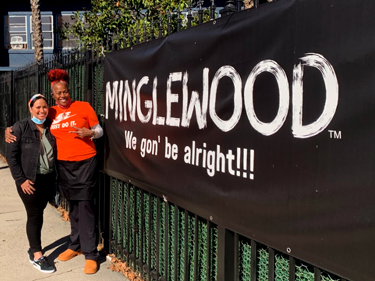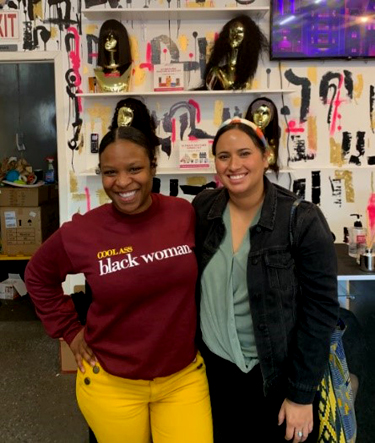The Recovery of Local Small Business
- Details
- Category: Community News
- Published on Wednesday, 01 June 2022 12:03
- Written by Patrizia Pelingon, Program Coordinator, Institute for Sustainable Development.
In an interview with Deborah Membreño, Program Officer at LISC LA, and Stephen Jordan, CEO of the Institute for Sustainable Development (ISD), Kinnard looks back on the tough decisions he once made to save his Black- and Afro-Latino-owned coffee shop, and still keep his studio apartment. Kinnard had to sub-lease his apartment, live in an RV parked behind the business, and shower at gyms. That is, until COVID grew worse and gyms closed, prompting him to get rid of the RV and return to his apartment.
 Lara Curtis and Deborah Membreño pose in front of the Minglewood banner. Photo credit: Stephen Jordan.
Lara Curtis and Deborah Membreño pose in front of the Minglewood banner. Photo credit: Stephen Jordan.Kinnard’s story is just one of the hundreds of thousands of small business owners in LA who have fought tooth and nail to stay open during COVID. With over 244,000 businesses and more minority- and women-owned businesses than anywhere else in the U.S., the health of LA’s small business ecosystem is critical for the area’s well-being.
In response to small business hardships, the Together for LA (TFLA) collaborative was formed to strengthen and support women- and diverse-owned small businesses, microenterprises, and nonprofits in LA County. Founding partners include the LA County Economic Development Corporation, LA Area Chamber of Commerce, LISC LA, Dr. Lucy Jones Center for Science and Society, ISD, and City and County of LA. No-cost technical assistance and resources are made possible through a generous grant from Wells Fargo’s Open for Business Fund.
As a part of its goal to tell the story of LA’s small businesses and nonprofits, ISD sat down with business owners and nonprofit leaders to get their take on COVID recovery and where to go from here. Their top concerns have included public health, equity, access to financial capital, and digital migration.
Public Health
 "Michelle Burton and Deborah Membreño at M'Squared Beauty Supply. Photo credit: Stephen Jordan."
"Michelle Burton and Deborah Membreño at M'Squared Beauty Supply. Photo credit: Stephen Jordan."More than two years after COVID-19 first hit LA, health and safety precautions are still hard to navigate for businesses. Michelle Burton, founder of M’Squared Beauty Supply in Inglewood, was “super swamped” before COVID. In another interview with Membreño and Jordan, Burton said that people were still “a little bit iffy” about coming into the store. Meanwhile, Coffee del Mundo saw half of the usual foot traffic during COVID, and adapted by opening only on the weekends.
Some businesses have found opportunities for growth. According to Kim Miranda of LA Healer, a spiritual health and well-being business, heightened anxiety and tension during the pandemic reinforced the need for more services like theirs, including “more folks to hold space and help alleviate stress… all of us need a little healing in our life.”
Simultaneously, businesses have struggled to keep up and comply with ever-changing COVID-19 rules, especially regarding whether to follow City or County rules. As one leader of a local chamber of commerce put it, “You cross the street and you’re in different rules.”
Equity and Inclusion
The pandemic has exacerbated systemic equity and inclusion issues for LA’s most vulnerable populations and neighborhoods, and business owners living in or serving these areas are no exception. For example, non-native English speakers have had trouble accessing and understanding what resources are available for their business. According to one staff member of a Chinese-American service organization, government aid like the Paycheck Protection Program and COVID forgiveness are among the hot topics that their clients have struggled to understand.
One Latino local nonprofit director expressed that, “Language is a tremendous barrier… maybe we’ll have to wait until our grandchildren and great-grandchildren grow and learn English… Despite there being millions of Latino speakers in the U.S., our needs aren’t met.”
Access to Financial Capital
Financial capital in the form of grants, loans, and more have been highly sought after during COVID-19. For some businesses, receiving one can make or break their business. For Kinnard, who received a $25,000 grant from PledgeLA (among others), “That grant literally saved me… If it wasn’t for the grants, we wouldn’t be here.”
Lara Curtis, founder and owner of Mingle’s Tea Bar in Inglewood, similarly expressed in an interview with Membreño and Jordan that receiving a grant “had me in tears.”
However, access to financial capital has not been equal across the board for LA’s small businesses. The CEO of one local business support organization stated that not a lot of options are available for women and owners of color. Additionally, some businesses don’t qualify for government funding if they haven’t been operating for a certain amount of time.
Local nonprofits, especially smaller ones and those that operate and serve in low-income neighborhoods, need funding to provide critical services to business owners and their communities. For one Watts-based nonprofit, obtaining funding has been challenged by having to compete with municipalities/cities/counties.
“How can a nonprofit compete with a municipality? It’s like a middle school competing with a university,” said their executive director.
Similarly, another Watts-based Latino nonprofit director expressed that, “Money hasn’t really been filtered to the Latino community… For a small organization like us without funding, we can’t just do the work and get nothing, which is what it feels like we’re expected to do.”
Digital Migration
It’s hard to find someone who hasn’t felt the effects of the “Digital Migration” brought on by the pandemic. Some business owners have closed their doors due to not wanting or being able to compete in the digitized marketing environment, while others have deemed it an opportunity.
Burton, a graduate of LISC LA’s Black Business Excellence Technical Assistance Initiative, and Kinnard, a graduate of LISC LA’s Keep our Shops on the Block Digital Accelerator Program, have found success in expanding their businesses online. Burton has even attracted customers as far as Louisiana, Pennsylvania, and Maryland.
However, the digital expansion also brings into question digital literacy and broadband accessibility.
“There’s a need to be more technologically friendly and meet clients where they are, but also to consider those who aren’t technologically savvy, which would leave behind a majority of our clients,” as told by a staff member of another local business-serving nonprofit. “Also, some people want to teach tech using tech, which doesn’t make sense.”
What’s Next?
There are many moving pieces to helping LA’s small businesses and neighborhoods recover and be more resilient. When asked “What does your community need most right now?,” Christian of Me Gusta Gourmet Tamales said:
“I think a lot of small businesses just need people, more people to come support them. You know, a lot of the farmers I know that work at farmer's markets - they work very hard and not a lot of people come and support at certain farmer's markets. We just need a little bit more support from there and essentially a little more advertisement - more marketing for the farmer's markets for the small businesses.”
One business in Mid-City credited being adaptive and allowing for growth as ways that helped their business thrive during the pandemic, which TFLA can help your business with at no cost.
If you’re a business owner in need of assistance, visit http://www.togetherforla.org
or contact This email address is being protected from spambots. You need JavaScript enabled to view it.This email address is being protected from spambots. You need JavaScript enabled to view it.
or call 1 (833) 473-2020.
News Category
-
Community News
In The CD 10 Race, Only One Candidate Has Earned The Right To Lead The District
 reprinted from CityWatch LA October 07 2024ELECTION 2024 - When you know the story of how Heather...
reprinted from CityWatch LA October 07 2024ELECTION 2024 - When you know the story of how Heather...
-
Neighborhood Councils
NEIGHBORHOOD COUNCIL UPDATE
Local Neighborhood Councils are a proactive way to become involved in your relationship with the...
-
City News
Communities Preparing for Disaster
 by Bob Gelfand CitywatchLAGELFAND’S WORLD - In a week of sometimes depressing news, I would like...
by Bob Gelfand CitywatchLAGELFAND’S WORLD - In a week of sometimes depressing news, I would like...
-
Crime Reports
HOW TO TELL IF YOU ARE THE TARGET OF A PHONE SCAM
 Every year, thousands of people lose money to telephone scams — from a few dollars to their life...
Every year, thousands of people lose money to telephone scams — from a few dollars to their life...
-
Local Development
WHAT IS DESTINATION: PICO AND WHY IS IT DOING ALL THOSE NICE THINGS ON PICO?
 Destination: Pico is a community nonprofit working to make Pico Boulevard more walkable, vibrant,...
Destination: Pico is a community nonprofit working to make Pico Boulevard more walkable, vibrant,...
Today8
Yesterday9
Week17
Month225
All989145
Kubik-Rubik Joomla! Extensions
Yesterday9
Week17
Month225
All989145
Currently are 34 guests and no members online
Kubik-Rubik Joomla! Extensions



